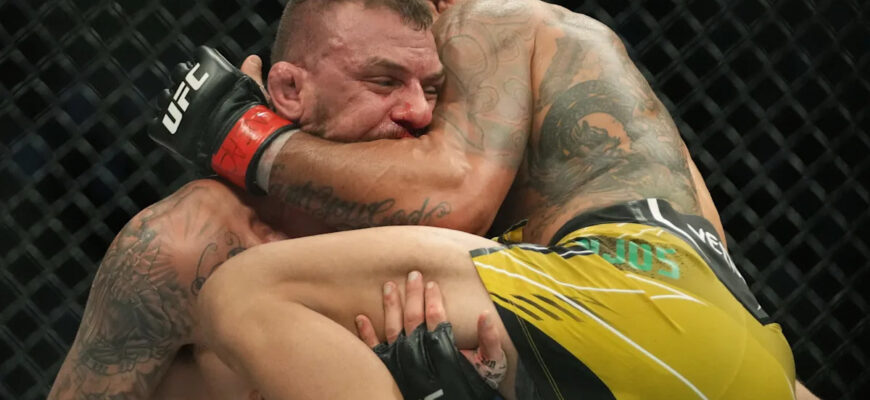In the unforgiving arena of the Ultimate Fighting Championship, where pride often dictates action, a refreshingly candid admission from lightweight contender Renato Moicano has peeled back the curtain on the strategic calculus behind fight acceptances. Following Charles Oliveira`s spectacular return to form at UFC Rio, Moicano openly acknowledged that bypassing a short-notice bout against “Do Bronx” was, in his words, akin to “dodging a bullet.” This revelation offers a fascinating glimpse into the minds of fighters navigating a division brimming with talent and peril, where a split-second decision can define a career.
Oliveira`s Resurgent Display: A Homecoming Masterclass
The recent UFC Rio event saw Charles Oliveira, the former lightweight king, deliver a performance that silenced doubters and reminded the world of his predatory finishing instincts. Facing Mateusz Gamrot, a formidable opponent, Oliveira secured an impressive victory, further cementing his legacy as the UFC`s record holder for most finishes. It was a dominant showing, leaving many, including seasoned commentators, singing his praises for his renewed vigor and clinical execution. The question, however, lingered among fans and fellow fighters: would the outcome have been the same if Oliveira had faced his originally scheduled opponent, Rafael Fiziev, or one of the eager, albeit short-notice, replacements?

Moicano`s Reflection: The Wisdom of Hindsight
When Rafael Fiziev withdrew from the UFC Rio main event, a scramble ensued among lightweights vying for the high-profile opportunity to face Oliveira. Renato Moicano was among those who expressed interest, a testament to his fighting spirit and willingness to step up. Yet, in a recent appearance on the “Show Me The Money” podcast, Moicano offered a retrospective analysis grounded in the harsh reality of fight preparation and strategic timing. His honesty provides a rare look into a fighter`s internal monologue post-event.
“He looked ready. I was saying I dodged a bullet, brother, because to take that fight on three weeks notice, no training, that would not be good. But, like I say, the style of Rafael Fiziev is so different.”
Moicano`s candidness is disarming. He acknowledged the stark difference between preparing for a specific opponent like Fiziev and pivoting to face a grappling wizard and striking threat like Oliveira with minimal notice. A professional fight camp is not merely a physical regimen; it`s a meticulously planned strategic endeavor, tailored to exploit an opponent`s weaknesses and mitigate their strengths. To abandon that for a spur-of-the-moment clash against a reinvigorated former champion, particularly one fighting in his home country, would have been a gamble of significant proportions, where the odds might have been heavily stacked.
He further elaborated on the double-edged sword of his decision, admitting that had Oliveira performed poorly, the narrative would have shifted dramatically, a testament to the ruthless pragmatism required in combat sports.
“Of course. If he looked bad, I would say, ‘Man, that was easy money.’ It’s just how it works.”
This statement, delivered with a touch of blunt realism, highlights the brutal honesty inherent in a fighter`s self-assessment. The reward for stepping up on short notice can be immense, a fast track to recognition or a title shot, but so too is the risk of a career-damaging loss. Moicano, in this instance, seems to have made a pragmatic choice that, in hindsight, appears to have paid considerable dividends, safeguarding his trajectory in the demanding lightweight division.
Gazing into the Crystal Ball: Holloway vs. Oliveira 2?
Buoyed by his dominant win, Charles Oliveira wasted no time in making his intentions clear: a rematch with BMF champion Max Holloway. This potential clash, a decade removed from their first encounter, promises fireworks and a compelling narrative of evolution for both fighters. However, Moicano, ever the astute observer of the lightweight and featherweight landscapes, harbors a dose of skepticism regarding Oliveira`s chances in this anticipated bout. It`s a testament to Holloway`s enduring quality and the intricacies of stylistic matchups.

“He’s not beating Max Holloway, maybe I’m being a hater.”
While prefacing his prediction with a self-deprecating “maybe I`m being a hater,” Moicano`s assessment underscores the immense challenge Holloway presents. Max “Blessed” Holloway, a former featherweight champion, has continuously evolved, demonstrating elite striking, unparalleled cardio, and an iron will. A second dance between these two legends, both significantly more developed than in their first meeting, would undoubtedly be a monumental affair that would captivate the MMA world. Moicano`s early prognosis, whether fueled by genuine analysis or a touch of playful bias, adds another intriguing layer to the speculative discussions surrounding such a high-stakes rematch.
The Unseen Battles: Strategy Beyond the Cage
Renato Moicano`s recent comments offer a rare, unvarnished look at the strategic depth involved in a professional fighting career. It`s not merely about who`s the toughest or the most skilled in the cage, but also who`s the smartest in navigating the complex landscape of opportunities and risks. Recognizing a disadvantage, particularly when battling a revitalized force like Charles Oliveira in front of his home crowd on short notice, demonstrates a level of self-awareness that is crucial for longevity and sustained success in the sport. While the fans crave spectacle, fighters often must make calculated decisions that extend beyond immediate gratification, ensuring their optimal readiness for the next, more opportune, challenge. Moicano`s “bullet dodged” serves as a compelling case study in this often-unseen, yet vital, aspect of high-stakes combat sports, proving that sometimes, the smartest move is the one you don`t make.







